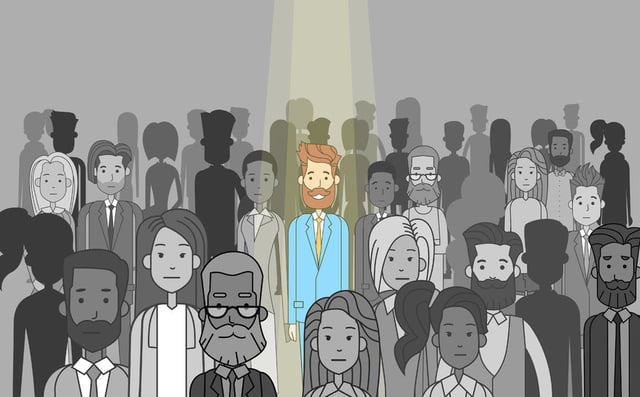Rick Steves, an influential travel writer, offers an opinion that's as apt for public speaking as it is startling: "Self-consciousness kills communication."
That thought changes speech nerves from a nuisance to a game-changer in terms of your effectiveness in reaching and influencing others, doesn't it?
Become a dynamic not a nervous presenter! Download my essential cheat sheet, "How to Calm Your Nerves Before Speaking."
Today, I'd like to discuss self-consciousness in public speaking and what you can do about it. I'll be responding to an article from WikiHow entitled, "How to Stop Feeling Self-Conscious."
Of course, as a speech coach, I'm concerned with how you can decrease the volume of self-consciousness while becoming a more dynamic and influential speaker. That's what I discuss below.
For audiences to have complete confidence in you, you need to be focused! Learn how in my Free cheat sheet, "10 Ways to Stay Fully Focused When Speaking."
Eleven Ways to Relax While Speaking in Public
I'll start by taking a look at some of the steps listed in the article concerning "decreasing feelings that interfere with everyday life." I'll then interpret those steps in terms of reducing self-consciousness caused by public speaking.
1. Identify what's causing your self-consciousness. If you feel like a spotlight is trained on you and that everyone is watching you, you'll be emotionally activated in a negative way. Why not use a more rational approach? Decide which speaking skills you lack, and which feelings of vulnerability affect you. Then write down what you can do about it. After all, if you can change it, it's not an insurmountable problem is it?2. Figure out who you're trying to please and why. This step calls for the answer to two questions: (1) Should you really be trying to please listeners, or offering something of value? And (2) Are you aiming for an impossible perfection in your speaking abilities? It's much better to be effective speaking to real people than to spend valuable energy trying to attain an ideal. Remember, you shouldn't be trying to please yourself. Make your audience your everything, and everything will fall naturally into place.
3. Redirect your attention. Think of this one as turning the focus of your energy around. You're speaking to make a difference in the lives of your listeners, aren't you? How can you accomplish that if your focus is directed inward instead of outward? You can't! Turn that spotlight around, so it's shining on your audience. They're the important people in the room. Aren't you supposed to be "illuminating" listeners?Be the kind of speaker who knows how to please audiences—by responding to their needs! Download my Free Guide, "6 Rules of Effective Public Speaking."
4. Make fun of yourself. A surefire way to get an audience on your side is to admit your own foibles, and not to take yourself too seriously. Learn how to use humor as a speaker, and you'll never go wrong. It needn't be a joke, either. You may be surprised at how fast your brain works when it has to, and might come up with something in the humorous vein without a lot of effort on your part.
5. Build your self-confidence. Replace your worries with a Personal Inventory. That's a tool we use at The Genard Method to help clients get past their self-consciousness about speaking and to get in touch with their abilities. Simply list any and all personal assets that help you communicate. Physical attributes, energy, passion, intelligence, etc. . . . write down those things that make you of value to your audience.
Overcoming speaking fear isn't just a helpful activity. It can change your life! Get the book named as "One of the 100 Best Confidence Books of All Time": Fearless Speaking.
7. Just let it be. Or to put it another way, "Enjoy yourself." One of the essential truths about public speaking is that you can't succeed by trying to be good. How, for instance, do you give an "excellent" speech? Instead, try your very best to serve the needs of listeners. Speakers who come across naturally without trying to impress end up doing exactly that.
Unlock your natural talents as a speaker so you're comfortable and confident! Get my Free ebook now, "12 Easy Ways to Achieve Presence and Charisma."
9. If you become self-conscious, immediately listen to what the other person is talking about. Listening closely instantly shifts you out of the self-conscious gear. When speaking in public, that means paying attention to body language. What nonverbal signals are listeners sending you? You need to interpret those signals accurately to respond appropriately. Audiences are giving you data concerning their level of interest, understanding or confusion, impatience, disagreement, etc. Learn to read that data.
Learn more about body language to be an effective speaker! Download my Free White Paper, "The Body Language Rules: 12 Ways to Be a More Powerful Speaker."
11. The moment you let someone judge who you are, is the moment you hand over your happiness to someone else. If you haven't learned this valuable lesson, put it in your pocket now. To quote from the WikiHow article: "Don't let other people tell you who you are. This is your life, not theirs."
Source: http://www.wikihow.com/Stop-Feeling-Self-Conscious
This blog was originally published in 2012. It is updated here.
You should follow me on Twitter here.
GET THE BOOK NAMED AS "ONE OF THE 100 BEST CONFIDENCE BOOKS OF ALL TIME!" Click on the image below.
Gary Genard is an actor, author, and expert in public speaking training and overcoming speaking fear. His company, Boston-based The Genard Method offers live 1:1 Zoom executive coaching and corporate group training worldwide. In 2021 for the eighth consecutive year, Gary has been ranked by Global Gurus as One of the World’s Top 30 Communication Professionals. He is the author of the Amazon Best-Seller How to Give a Speech. His second book, Fearless Speaking, was named in 2019 as "One of the 100 Best Confidence Books of All Time." His latest book is The Online Meetings Handbook, now available at The Genard Method and at Amazon. To know more about TGM's services, Contact Gary here.





